OMAHA, Neb. — Game One of the College Baseball World Series final certainly didn’t go the way Tim Corbin and his Vanderbilt Commodores had hoped.
Just as they’ve done all postseason, Erik Bakich’s Michigan Wolverines came out hot and never gave up. Even when Vanderbilt’s Drake Fellows seemed to have worked out of numerous jams, somehow keeping the score close, the Commodore bullpen couldn’t contain the rampant Wolverine bats. Michigan’s Tommy Henry threw a gem: 8.1 IP, 7 H, 4 ER, 1 BB, 8 K’s, propelling the Michigan Wolverines to a 7-4 victory over the Commodores in game one of the College World Series finals.
“I think the difference was certainly Tommy Henry,” Coach Corbin said after the game. ” You have to give that kid a lot of credit. He threw a lot of strikes. He minimized damage when he had to. When he found himself in a little bit of trouble, he was able to negate our offense. He did a really good job. He didn’t allow many base runners, and as I said, he just kind of forced the action a little bit with his fastball and his off-speed stuff.”
Michigan entered the National Championship on a dangerous offensive streak, piecing together a first inning lead in all three of their College World Series contests. That momentum continued into tonight’s matchup, as Drake Fellows struggled to find a rhythm early. He forfeited a walk and two doubles in the first inning, gifting Michigan a two run lead to continue their streak.
Vanderbilt–the home team, the higher seed, and the heavy favorite to win–failed to respond with their offense. Their dead silent first inning ended in just seven pitches, while Fellows’ pitching woes continued in the second inning. He forfeited another two runs off a double and a pair of walks, increasing the maize and blue’s lead to 4-0.
“Offensively we got knocked back on our heels early with the two-run first and second inning,” said Corbin. “And then I thought Drake settled in pretty well, pitched out of a jam one of those innings, but his pitch count rolled up just because of the first couple of innings and kind of negated his opportunity of going deeper into the ballgame”
The Wolverines have now been on the road for six weeks, playing for their postseason lives most every night, yet they remain composed against the Commodores. Many expected Vanderbilt’s dominant lineup to send Michigan into a whirlwind of stress, but through one game its been quite the opposite.
Fellows needed a significant 51 pitches to get through two frames, yet somehow, the damage on the scoreboard was limited to just four. The Commodores offense finally showed some life in the bottom of the second, beginning with a Ty Duvall RBI single. The ensuing pitch escaped the catcher’s grasp, gifting Vanderbilt another run and chipping the lead down to 4-2. It may have taken just two frames for the Commodores to put numbers on the board, but Fellows made it seem like an eternity.
Finally, Fellows sped things up. The sixth round pick of the San Diego Padres proceeded to strike out the side in the third, eventually dragging the lifeless Commodore offense along until the sixth inning. Fellows didn’t forfeit more than the initial four runs, but if his 114 pitches revealed anything, it’s that the Commodores had to work out of quite a few scary jams.
From pitches thrown, to hits notched, the Commodores seemed to be completely outmatched by Michigan, yet the scoreboard told a different story. Down by just two, they were still in the game.
The top of the sixth inning seemed like a microcosm of that very story. The Commodores’ uncharacteristic, lackadaisical defensive play first manifested itself in a routine dribbler bobbled by Austin Martin. The ever-so-rare error gave Michigan a free baserunner. Fellows followed up the mistake with one of his own– a terribly high pitch that was just barely corralled by catcher Ty Duvall, but his ensuing throw to second wasn’t salvageable. It sailed about six feet over the outstretched hand of Harrison Ray at second, where Ethan Paul’s backup prevented more gifted runs.
After the slew of mistakes, Fellows continued to walk Michigan’s nine hitter on just five pitches–a cringeworthy series of pitches that seemed quite inexcusable in the World Series; let alone in the finals, against a team with arguably the strongest top of the order in the country. Fellows’ night ended there and somehow, Zach King got the Commodores out of the inning.
Just when it looked like Michigan’s 4-2 lead would be permanent, the Commodores showed their first sign of life since the second inning–a deep, high flying moonshot by JJ Bleday, his first shot to leave the park since May 25th. Given the box score, one would’ve guessed the Commodores had no shot in this game, but Bleday’s solo rocket to right cut the deficit to one.
And of course, the Commodores season-long kryptonite just kept burying the team. Their bullpen’s luck had run shallow after King pitched 0.1 innings to get out of a jam. He returned to form, letting up two earned runs in the seventh. In the eighth, his replacement was no better–the struggling Patrick Raby allowed one run before loading the bases and miraculously escaping the jam.
Michigan’s 7-3 lead nearly carried them until the end, but Vanderbilt’s loaded lineup had one more shot at retaliation in the ninth. They put on their rally caps, hoping to chop away further, and drew a lousy, one-run card from the deck. Their rebuttal had cut the lead to 7-4, the game’s final score.
According to Bleday, tomorrow is a new day.
“Each game has a different personality. They obviously came out and got us, and credit to their guy. He’s been their man all year. He put us away. Tomorrow is going to be a new ballgame, and it’s going to be a different personality to that game, and we’re just going to keep doing what we’ve been doing all year.”
Freshman Kumar Rocker will get the nod for the Commodores tomorrow. A loss would end their season. A win would give them one more day.
Sound familiar?



